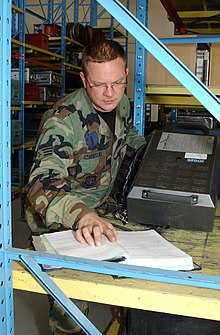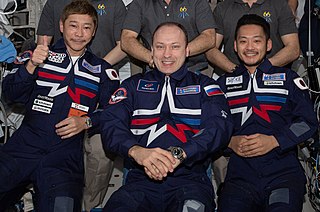
Space tourism is human space travel for recreational purposes. There are several different types of space tourism, including orbital, suborbital and lunar space tourism. Tourists are motivated by the possibility of viewing Earth from space, feeling weightlessness, experiencing extremely high speed and something unusual, and contributing to science.
Human spaceflight programs have been conducted, started, or planned by multiple countries and companies. Until the 21st century, human spaceflight programs were sponsored exclusively by governments, through either the military or civilian space agencies. With the launch of the privately funded SpaceShipOne in 2004, a new category of human spaceflight programs – commercial human spaceflight – arrived. By the end of 2022, three countries and one private company (SpaceX) had successfully launched humans to Earth orbit, and two private companies had launched humans on a suborbital trajectory.

Space Exploration Technologies Corporation, commonly referred to as SpaceX, is an American spacecraft manufacturer, launch service provider and satellite communications company headquartered in Hawthorne, California. The company was founded in 2002 by Elon Musk with the goal of reducing space transportation costs and ultimately developing a sustainable colony on Mars. The company currently produces and operates the Falcon 9 and Falcon Heavy rockets along with the Dragon and Starship spacecraft.

Jared Isaacman is an American entrepreneur, pilot, philanthropist, and space tourist. He is the founder of Draken International, a private air force provider and the founder and CEO of Shift4 Payments, a payment processor. As of February 2023, his estimated net worth is US$2 billion.
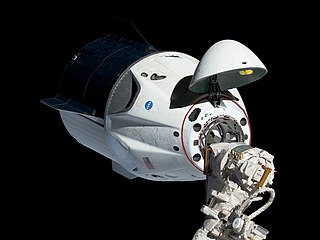
Dragon 2 is a class of partially reusable spacecraft developed, manufactured, and operated by American space company SpaceX, primarily for flights to the International Space Station (ISS). SpaceX also launches private missions, such as Inspiration4 and Axiom Space Missions. There are two variants of the Dragon spacecraft: Crew Dragon, a spacecraft capable of ferrying four crewmembers, and Cargo Dragon, a replacement for the original Dragon 1 used to carry freight to and from space. The spacecraft consists of a reusable space capsule and an expendable trunk module. The spacecraft launches atop a Falcon 9 Block 5 rocket and the capsule returns to Earth through splashdown. It has proven to be the most cost effective spacecraft in history to be used by NASA.
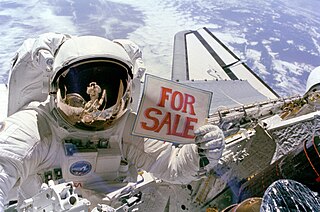
The following is a timeline of important events in the history of private spaceflight, including important technical as well as legislative and political advances. Though the industry has its origins in the early 1960s, soon after the beginning of the Space Age, private companies did not begin conducting launches into space until the 1980s, and it was not until the 21st century that multiple companies began privately developing and operating launch vehicles and spacecraft in earnest.

The billionaire space race is the rivalry among entrepreneurs who have entered the space industry from other industries - particularly computing. This private spaceflight race involves sending privately developed rockets and vehicles to various destinations in space, often in response to government programs or to develop the space tourism sector.
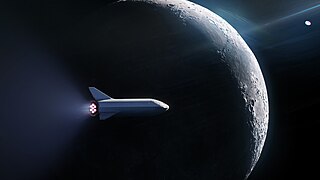
The dearMoonproject is a lunar tourism mission and art project conceived and financed by Japanese billionaire Yusaku Maezawa. It will make use of a SpaceX Starship spacecraft on a private spaceflight flying a single circumlunar trajectory around the Moon. The passengers will be Maezawa and eight other civilians, and there may be one or two crew members. The project was unveiled in September 2018 and was scheduled to launch in 2023. It has since been indefinitely delayed until Starship completes development. The project objective is to have eight passengers travel with Maezawa for free around the Moon on a six-day tour. Maezawa said that they expect the experience of space tourism to inspire the accompanying passengers in the creation of something new. If successful, the art would be exhibited some time after returning to Earth with the goal of promoting peace around the world.

Sian Hayley "Leo" Proctor is an American commercial astronaut, geology professor, artist, author, and science communicator. She became the first female commercial spaceship pilot on the all-civilian Inspiration4 orbital spaceflight, 15 September 2021. As pilot of the Inspiration4's SpaceX Crew Dragon space capsule, Proctor became the first African-American woman to pilot a spacecraft. She was also the education outreach officer for the first Hawaii Space Exploration Analog and Simulation (HI-SEAS) Mission.

Axiom Mission 1 was a privately funded and operated crewed mission to the International Space Station (ISS). The mission was operated by Axiom Space out of Axiom's Mission Control Center MCC-A in Houston, Texas. The flight launched on 8 April 2022 from Kennedy Space Center in Florida. The spacecraft used was a SpaceX Crew Dragon. The crew consisted of Michael López-Alegría, an American born in Spain and a professionally trained astronaut hired by Axiom, Eytan Stibbe from Israel, Larry Connor from the United States, and Mark Pathy from Canada.

Crew Dragon Resilience is a Crew Dragon spacecraft manufactured by SpaceX and built under NASA's Commercial Crew Program. In November 2020, it was launched into orbit to the International Space Station as part of the Crew-1 mission. With crew prompting, Resilience docked autonomously to the station at 04:01 UTC on 17 November 2020, or Day 2 of the mission, marking the first operational docking of a Crew Dragon and the first operational docking of the Commercial Crew Program. The mission carried four additional members of Expedition 64 to the three already on station.

Inspiration4 was a 2021 human spaceflight operated by SpaceX on behalf of Shift4 Payments CEO Jared Isaacman. The mission launched the Crew Dragon Resilience on 16 September 2021 at 00:02:56 UTC from Kennedy Space Center's Launch Complex 39A atop a Falcon 9 launch vehicle. It placed the Dragon capsule into low Earth orbit with mission termination on 18 September 2021 at 23:06:49 UTC when Resilience splashed down in the Atlantic Ocean.
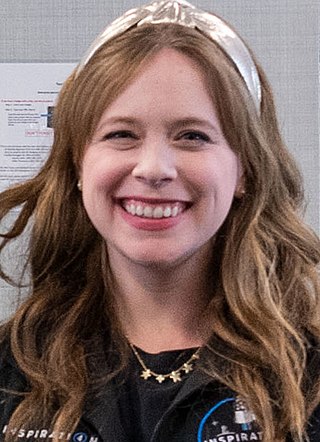
Hayley Arceneaux is a St. Jude Children's Research Hospital physician assistant and commercial astronaut. She joined billionaire Jared Isaacman on SpaceX's first private spaceflight Inspiration4, which launched on September 16, 2021, 00:02:56 UTC, and successfully water-landed local-time on Saturday, September 18. Arceneaux became the first human in space with a prosthetic leg bone after surviving bone cancer. At age 29, Arceneaux was the youngest American to travel to space, surpassed a few months later by 23 year old Cameron Bess aboard Blue Origin NS-19. Arceneaux remains the youngest American to have orbited the Earth.
An amateur astronaut is an untrained person participating in a spaceflight. The term is widely used by SpaceX and others, and by widespread media, especially after the launch of Inspiration4, crewed by 4 untrained humans, on a 3-day flight around the Earth.

Countdown: Inspiration4 Mission to Space is a 2021 American five-part docuseries jointly produced by Netflix and Time Studios to chronicle, in near real-time, the successful SpaceX Inspiration4 orbital mission which occurred in September 2021.

Anil Menon is a lieutenant colonel in the United States Air Force, emergency medicine physician and NASA astronaut.
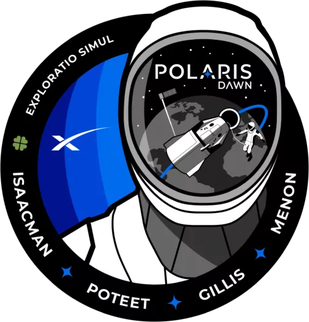
Polaris Dawn is a planned private human spaceflight mission, operated by SpaceX on behalf of Shift4 Payments CEO Jared Isaacman, scheduled to launch no earlier than mid-2024. The flight will be using a Crew Dragon capsule, and is the first of three planned missions in the Polaris program.

Anna Menon is an American engineer scheduled to fly on Polaris Dawn, a private space mission. Menon worked for NASA for seven years before joining SpaceX, where she works as a lead engineer of space operations.
The Polaris Program is a planned human spaceflight program organized by businessman and commercial astronaut Jared Isaacman. Isaacman, who commanded the first all-civilian spaceflight—Inspiration4—in September 2021, purchased flights from SpaceX in order to create the Polaris Program. The first two flights will use the SpaceX Crew Dragon spacecraft, while the third flight is planned to be the first crewed Starship flight. Polaris Dawn, the first flight, will attempt the first private spacewalk.

Sarah Gillis is an American engineer who is scheduled to fly on Polaris Dawn, a private space mission.
